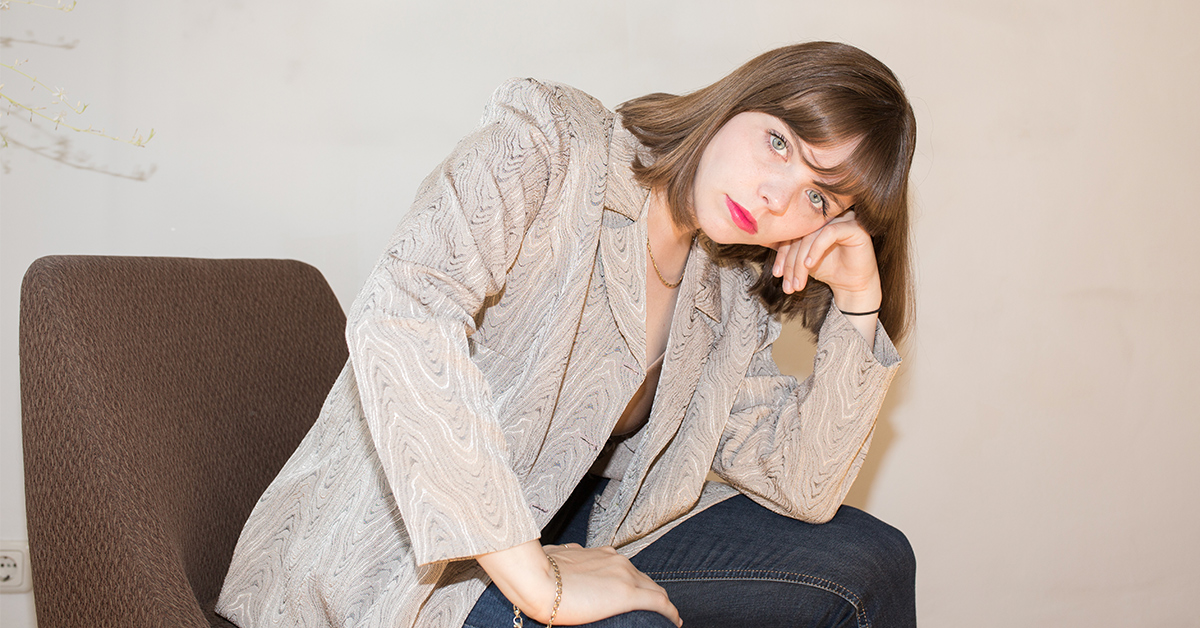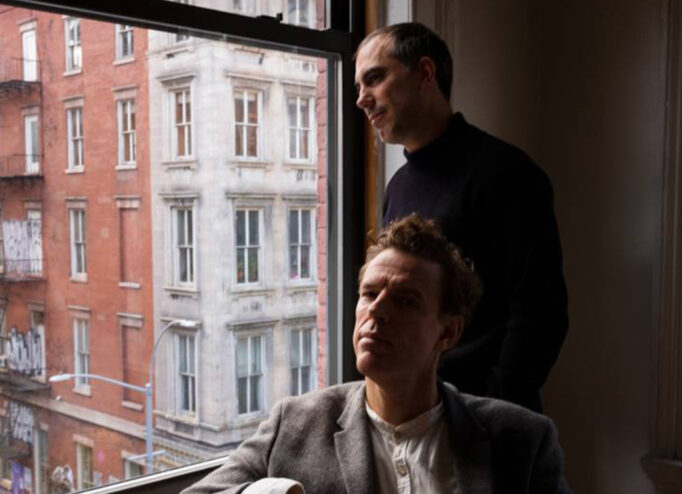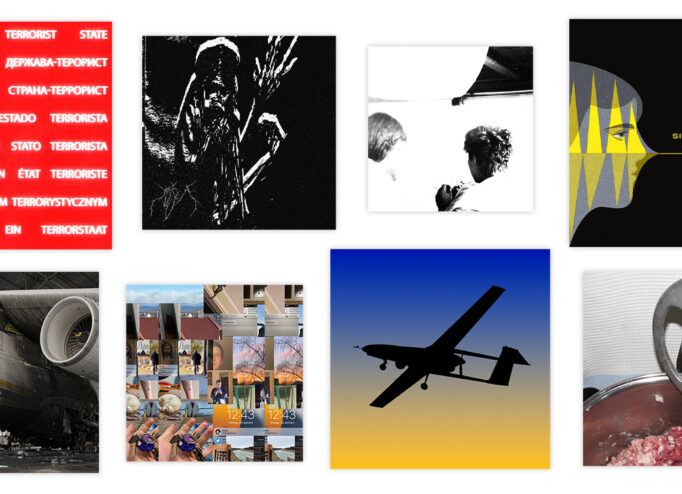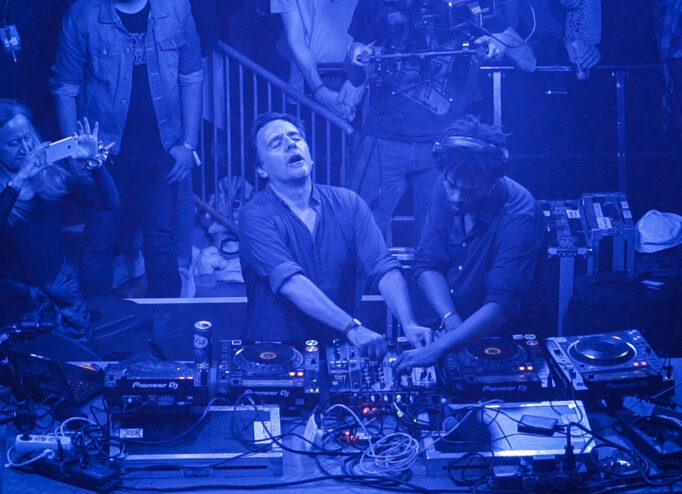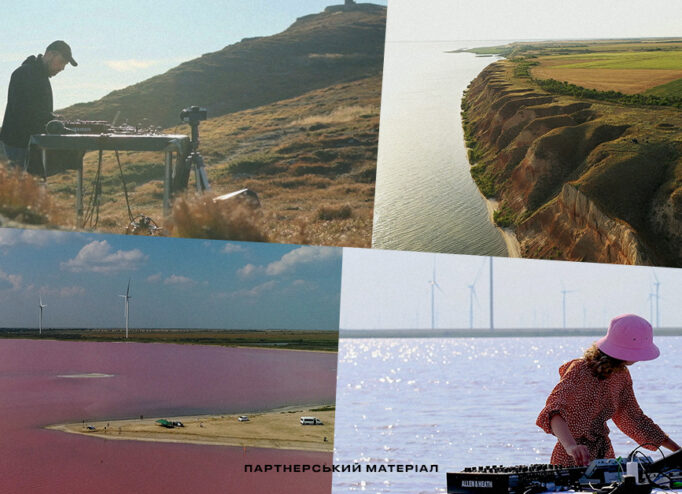Producer, DJ and promoter Sedef Adasi is a regular guest in Kyiv. She played in a club ∄ on Kirillovskaya Street last weekend. Her DJ sets are always an unpredictable journey and it consists of classical house, space disco, techno and acid. Sedef skillfully creates the right vibe on the dance floor, whether it is a party in a techno mecca like Berghain/Panorama Bar, or an international festival. So it comes as no surprise that her touring schedule is quite busy even in these uncertain times. However, wherever Sedef plays another weekend — Kyiv, London, or Vienna, she always returns home to the small Bavarian town Augsburg.
Sedef does a lot for her native scene — she hosts HAMAM nights in the local City Club, develops initiatives for the queer community, hosts well-known artists and supports the local talents. Besides, she also finds time to make music — her first «Fantasy zone» EP was released this spring.
Olga Karlovich, special correspondent for DTF Magazine talked to Sedef about her approach to producing, DJing and organizing parties, exploring identity in creativity and merging different cultures on the dance floor, music escapism, and why it’s so important to develop the scene in small towns
First performances and gender prejudices
— Sedef, this is your fourth time in Kyiv. So you may be familiar with things to do here.
— Well, kind of. Kyiv is doubtless one of my favourite cities to play in at the moment. It is so special because of the people and the scene. Everyone is welcoming, and you get so much good energy. I really appreciate it. So, there’s definitely something between me and Kyiv for sure.
— Do you remember your first party ever, where you came just to have fun, not as a DJ?
— Do you mean when I was young? (laughing)
— Well, you are still young. How old were you then? And what was that experience like?
— It was the private party my sister took me to, the birthday of her friends.
It was my first party with music and alcohol. The people there were cool and older than me. They were listening to hip-hop and R&B, and those party tracks made such a vibe that I remember myself thinking: «Wow! What is happening here?». I started to record CD mixes very early, at the age of 12 or 13, so everything I saw impressed me a lot, even though it was not a real discotheque.
— I know you started as a DJ playing in a cloth shop and at birthday parties.
— That’s true. I played at the mall, in the shoe store, once a month. There was a shopping day when they brought a DJ in to encourage customers to shop. I was 16 y.o back then. I did mixes at home, but I’ve never been in a club. However, I already knew that DJ is also a profession.
It was super fun and good to play for someone. It allowed me to practice in front of people, take my time and not be shy. I probably wouldn’t have felt as comfortable behind the decks as I do today if I hadn’t had that experience. Now I love to interact with people on the dancefloor.
I also used to play at weddings and birthdays, at children’s too. I’ve been doing this for about five-six years. But then one day, a friend of mine came into the shoe store to return shoes and saw me there. It was a big surprise for her that I can dj. She asked why I don’t play at parties she runs with her friends. I hadn’t even thought about doing it in a club until that moment

— And what happened next? It was the first time you played in a club as I understood. How did everything go?
— I was so nervous! I’d never played in front of so many people before. I am still nervous before gigs because the audience is always new. But at that moment, at that party — OMG, I was sweating. Everyone was staring at me because I am a girl. Nobody cares if the guy behind the decks, but women people evaluate more intently.
Of course, It’s better now. But can you imagine a small town in Bavaria a few years ago? I mean, it wasn’t even Berlin. We have 300 000 people in Augsburg, and everybody knows each other. So women DJs could be counted. And suddenly some little girl was playing electronic music. It was like: «Wow! Who is she?». So, yes, I was very excited and nervous. But then I drank prosecco, and it was ok.
I had lots of fun at that party. My friends came, and they were proud of me. And I was so crazy about music. I got so much energy from the crowd. At that moment, I understood that this is what I want to do in the future. I wanted to be a DJ and play for more people. I needed to keep going.
— What kind of music did you play in the beginning, when you were a DJ in the shoe store and at weddings?
— It was mostly R&B, pop, and some 80s stuff when I started recording mixes at home. I have three older sisters, so I got many 80s, 70s, and 90s records from them. There was also Turkish music because my parents are Turkish. And I mixed it all.
When I was playing in the store, I didn’t really follow any specific genre. And I still don’t. I can easily play Madonna if I want. It all depends on my mood and the crowd. My sets are more house-like, or dark, or acid sometimes… But I will play everything if I have 5 hours! I am not a techno DJ.
I am not a techno DJ. I like emotions and groove. And I never prepare my sets in advance. It is always a journey for me. I have tons of music in my bag. There’s some new and old stuff, so I can choose what to play depending on the party flow. This kind of approach is more natural and exciting to me.
— Does it mean that you prefer to play in clubs rather than festivals?
— It is two different things and experiences.You can play for 10 000 people at the festival. It is a pretty strong and good feeling. The crowd gives you so much energy, and I like that. Festivals are cool! But I would rather prefer a five-hour-long set in a club because it is another level of connection with the dancefloor. It is more deep and intense.
— You mentioned that when you first started playing in clubs, you faced gender preconceptions. Some people have judged your DJing ability by the fact that you are a woman. How did you get through this?
— I was a bit sad, maybe, but then I just accepted the situation. My passion for music was so strong that no one could destroy it.
Luckily I was strong enough to look above people who judged me. I practised everything on my own, nobody told me what to do. I even had no money to buy DJ equipment.
I went to a vinyl shop, and the guy from there began to list the things I should have. It was this and that, turntables, and so on. It came out for 3000 — 5000 euros. But it was too expensive, so I decided to start with a controller. «But this is so uncool!», — that shop boy told me. And I am so happy that I didn’t listen to him.
I got a job for 5 euro per hour and earned money for the controller. It was the old thing and not perfect, but I could practice and learn everything by myself. And now, based on my own experience, I know that everyone can do it. It really doesn’t matter if you are a woman or a guy. You just have to do it, have a vision and follow your passion.
Yes, it is hard. I’ve played for free in the shoe store and at weddings for so many years. I was 13 when I started to get into music, and I am 28 now. And I think it was a long but good journey.
About techno and her own style of DJing
— Now you play at Panorama Bar and other famous venues and festivals, record podcasts for respected music media and institutions. What do you think helped you become that successful and demanding? What makes you different from other DJs? The competition on the scene is very high.
— That’s true. There are so many great artists. It is hard to say what makes me different. Maybe I stand out because I play very differently, every genre. I can start with techno, then switch to house, and everyone will try to understand what is going on here.
There is always a trend. It could be techno, electro, acid… Sure, I love every style, but I never focus only on one thing.
— Have you ever had situations when people left the dancefloor while you were playing?
— You know, there is always someone leaving the dancefloor. I played in a club in Vienna two weeks ago. Austria is more techno-oriented, so people who expected more techno in my set were like: «The music is so good. But can you give it more power?». I answered that I am playing in my style, so, please, don’t interrupt me. There is always someone more into techno, house or whatever. You can’t make perfect for everyone.
— But sometimes, people are just closed off to new experiences. They come to a party and want to hear only techno and nothing else. It’s not even a matter of musical preferences in this case.
— I think a lot of people go to a party just because they want to have fun. It’s not about music sometimes and it makes me sad. And that’s why I appreciate places like ∄ where people really check DJs in the lineup out before they go clubbing. Because music is the main thing and this is so important.
About non-boring parties and the queer community
— But now you run parties yourself and can make your own rules. Could you please tell me a bit more about your HAMAM Nights? What vibe do you want to create as a promoter? And what message do you want to communicate?
I started HAMAM because I was desperate. I played at very boring hetero parties in my hometown— everything was black, ordinary, and techno, and there were only white dudes behind the DJ booth. It was the commercial techno side.
I brought my ideas to the promoters, but they brushed them off. «Ok. We’ll do it next time» — they always said and did nothing.
But Augsburg is a nice city. We don’t have a big party scene, but we have a good club called Сity Сlub. There are also so many cool people in our town. And they needed a place to express themselves, feel free, be queer.

And I have long wanted to organize something on my own but was afraid to do this. I was doubting for almost three years. But then, one evening, I took a piece of paper, one bottle of wine, cigarettes and wrote down what was important to me as a party goer. I made the same list from a DJ point of view. Where would I love to play? I tried to answer this question in as much detail as possible and remember all the parties I enjoyed playing at. Afterwards, I had so many notes.
I am a very active person, I need to try things out. Otherwise, I won’t be happy. So I decided to have one party. I thought, if it works, I will continue. If not… Well, it’s okay too, I’ll understand that I’m not a promoter.
I started to think about graphics, that it should be so cool, it should be black and minimalistic. But then I caught myself on these stereotyped ideas. I asked myself — what is true coolness? Is it cool to wear all black, or do I want to see more life and energy and not follow these boring party standards? And I thought: «No, you will do completely different things!».
Also, it was so important to me to have a message for my parties. We are the electronic music community and have so many important things to communicate. I wanted to connect people. No matter which culture or religion you are, we are all Habibis to each other on the dance floor. I have Turkish roots myself. My parents are from Yugoslavia, East Makedonia. So my sisters and I grew up surrounded by Yugoslavian people. And I was borned and live most of my life in Augsburg, in Germany. It is such a mixture!
It seemed to me that HAMAM is the perfect name for a party with this kind of vision. Have you ever been to a hamam?
— Yes, I’ve been.
— So you know how hot it is. And that’s what I wanted! I wanted to go out to a sweaty party where everyone feels comfortable. It all came together. It was so crazy. And then I definitely decided not to go for black. Instead, everything was supposed to be pink.
I started the HAMAM Instagram account. There were cool pictures, so people followed it. Although, even my friends didn’t know back then I was running the page. I posted everything I wanted, and people really appreciate that. Then the first party happened. It was insane, a completely new experience that nobody expected. The real queer party has come to the City club. Since then, I do my nights every three months.
HAMAM was started with only local artists, but then I wanted to book Tama Sumo from Ostgut Ton after seeing how that everything was going well. I am a huge fan! I wrote to her booker but didn’t really expect any reply. «Hello! This is Sedef from the City Club Augsburg». What, Augsburg? Where is it? Of course, our city is beautiful, but Ostgut Ton/Berghain are such big names, you know… Can you imagine how excited I was when the booker came back to me? And then Tama played at the HAMAM party.
I started to book more and more artists from that moment. And now everyone in Germany knows the City Club in Augsburg. Many great acts played here.
I believe that this is so important to support club culture in small cities. I built my whole career in Augsburg, didn’t move to Berlin or anywhere. I try to create spaces and things for the local scene and people. This is what gives me energy and makes me really happy.
— Do you feel that communities in small cities are more open?
— Not at all. They are more closed. Everybody knows each other in a small city. But we live in a system with pressure, where everything is black or white. There are so many queer people in big cities, you see them, and this is perceived normal, how it should be! But it is more reserved, people are shyer in small towns, but there is also a community that needs safer spaces here.
— How did you manage to reach out to people in Augsburg and bring the community together with HAMAM Nights?
— I think it’s about spirit and message, which reflect all the components of HAMAM such as visuals, Instagram… You can see it’s not just a boring hetero party but something special. People were excited and curious. They were hungry for this.
Besides, the truth from my side helped in some way. I also was in a sort of frame, but I could get out of it and present everything differently.
— And it seems like you are a very organized person.
— Well, it was really a part of my life. I woke up at 2 AM with new Ideas for the parties in my mind. For instance, we have this Kolonya at HAMAM Nights. It’s a Turkish perfume with a lemon aroma used for sanitizing and refreshing hands. I will offer you Kolonya first if you visit me at my home in Turkey. It’s like saying: «Nice to meet you and welcome», it is a kind of welcome gift.
We also give people raki shots at the HAMAM parties. And I give a welcome flower, a rose, to the DJs I host. Sometimes male artists react to it as funny but sweet. «OMG! Nobody has ever given me a flower!». It is so interesting to see how small things change everything.
— And it’s also interesting how you maintain and express a connection with your roots through such little things. You generally pay much attention to exploring the topic of identity in your work, whether it’s parties, making music or DJ sets. Why is it so important to you?
— Because every human being is different and every culture has something special. It would be so cool to take various traditions and put them in one bowl. We can learn from each other — I can learn something from you, and you can learn something from me. It is so inspiring.
About pandemic and musical escapism
— You released your first ever EP called «Fantasy zone» this summer. Tell me, please, how did the work on it go?
— Actually, the EP should’ve come out a year ago. But Corona just started back then, and I didn’t feel ready to release this work. Summer 2020 was nice. I had shows again, and people were more relieved. But the situation became worse again in autumn, and I was like: «Ok. What am I going to do now?».
Music has become a kind of therapy for me. I went to my studio where I was making music all day. I understood that I have to stay productive even if I am depressed, that I can’t just let things go. I learnt a lot about production and sound. My tracks were becoming better and more passionate.
Afterwards, I made about 30 new tracks for my EP and agreed on spring as a deadline for the release. And the last week before it I produced two more things. It was «Turbo Ride» and «Mermaids On Acid».
«Fantasy zone» came out so special. It is not a club EP. There are different emotions in this music such as darkness and also danceable vibes.
— Do you see music as a way to escape from reality?
— Yes. That’s why I called my EP ‘Fantasy zone’.
I needed some fantasy to keep going and not get depressed and ill. It’s hard but possible to create and save this fantasy. And it gives you the way to escape if you do.
— What lessons have you learnt from the pandemic situation, besides understanding that music is a kind of therapy for you and an opportunity to escape from problems?
— I learnt to calm down. And it is a positive thing because I am a very energetic person who always says «yes» to almost everything. I’ve also started to think more about the environmental issues and what I can do [to reduce the negative impact on nature]. For instance, you don’t book a DJ from amerika exclusively for your show anymore. Instead, you check if this artist has a gig in your area, so you can also invite him to play. I try to adapt such things to my projects.

Also, I came up with a new project called «Lessons in the club» because I had more free time. I want to create an open safer space for women and the queer community. We can do DJs or, for example, promoter lessons for them once a month. The idea is to empower girls and queer people and give them the confidence to do such things.
And another thing I’ve learnt is to stay positive no matter what. Of course, there were very depressing days, but I told myself: «Hey! You are healthy, you can pay your bills and have something to eat. You have nothing to worry about». I realised that the most important thing for me is to be with my family and friends. We don’t need to forget to appreciate things we have.
— Things are gradually getting better now. Parties and festivals are returning to our lives, and you have started touring again. Aren’t you afraid that you won’t have time to make music again? Or is this not what you are worried about?
— I am not a 100% producer. I love both [playing and making music. Also, even though I am touring, I have a whole week before the weekend to go to the studio. But now, I can’t wait for everything to come back to life, so it will be possible to combine DJing and production again. My way is to mix things. I was stuck a whole year in the studio, so it’s also nice to escape to the other side.
Читайте также:
